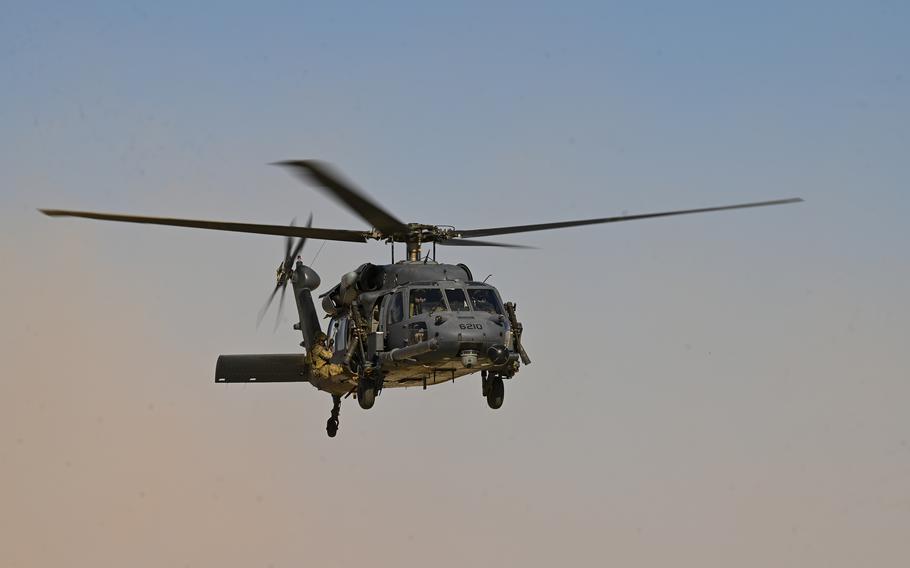
A U.S. Air Force Pave Hawk trains with air crew members assigned to the 11th Expeditionary Combat Aviation Brigade on July 6, 2022 at an undisclosed location. A commander from the brigade took actions that constituted reprisal after blocking a soldier’s deployment and reducing her pay, following a sexual assault complaint that she made. (Ashley Sokolov/U.S. Army)
A soldier who filed a sexual assault complaint ahead of her unit’s deployment was damaged financially by her boss’ reprisal but wasn’t wrongly denied a promotion, Defense Department investigators decided recently.
The case, which involved the 11th Expeditionary Combat Aviation Brigade based at Fort Carson, Colo., centered on a commander’s decision to block the soldier’s deployment to Kuwait following her 2021 report submitted in the runup to the mission.
While the complainant remained eager to deploy, her boss stood in the way, the DOD’s Inspector General said in a Sept. 5 report. The IG did not name the soldiers involved in the case or indicate what ranks they were.
If deployed, the soldier could have earned $150 of hazardous duty incentive pay per month of deployment by flying at least four hours per month in her position, the IG said.
“Removing the Complainant from the deployment had an unfavorable effect ... (and resulted in) qualifying unfavorable personnel actions,” the report said.
However, the evidence did not support the accusation that she was denied a promotion because of the commander’s actions, the IG said.
Military law enforcement launched an investigation after the woman reported on Nov. 30, 2021, to her unit that she had been sexually assaulted. The report was made while elements of the reserve unit were at Fort Cavazos in Texas getting ready to deploy.
In the aftermath, witnesses said her boss weighed whether to allow the soldier to deploy with the unit. Witnesses said the commander was given counsel about the decision. One witness said the commander was warned that denial could constitute retaliation.
In written evidence provided to the IG, a witness said the commander described his dilemma this way: Either the soldier made up the whole thing and was “bat s--- crazy,” or she was telling the truth and a deployment would be a hindrance to her recovery.
The commander, described throughout the IG report as the “subject,” testified that he did not recall making the statement that the complainant was “bat s--- crazy.” Around Dec. 6, 2021, he decided to remove the complainant from the deployment.
The report said the evidence supported the argument that the commander “had a personal motive to reprise” because the sexual assault allegations were against unit members and because “he viewed reports of sexual assault as something for him to distance himself from.”
Witness testimony supported the conclusion that the commander did not fully support the military’s SHARP program focused on preventing assault and harassment, the IG determined, adding that the commander had questioned the woman’s report without reason.
In defending his actions, the commander told the IG that he was concerned about the soldier’s well-being and ability to recover. The potential lack of resources in Kuwait to ensure her well-being also was a factor, he said.
The commander also told the IG that during the process of making the decision, he had consulted Gen. Harvey Cutchin, then commander of USAR Aviation Command, and Maj. Gen. Richard Johnson, who was then serving at head of First Army Division West.
Johnson said in a statement to the IG that his impression was that the commander was trying to do the right thing.
“I just don’t sense that there was some kind of malice or some kind of punishment, you know, underlying the actions that they took,” he said.
However, the IG disagreed, saying that the evidence did not support the notion that the commander took steps to ensure help for the soldier.
And while he had various ways to assess her ability to deploy, such as seeking a mental health evaluation before deciding, he did not take such action, the IG said.